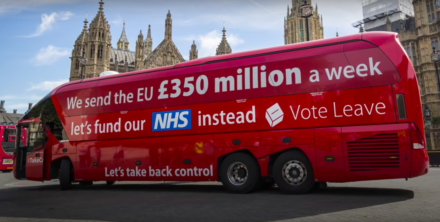
I have now retired as an MEP. With that comes fewer meetings and much more time to observe and reflect on the state of UK politics. It is both a blessing and a curse. One of the factors that risks getting lost in the debate over the government’s ramshackle negotiations is the enormous gulf between what was promised by Leave campaigners before the referendum in 2016 and the raw reality of what is being served up by the Tories today. Just look at just three of the headline promises and contrast them with what is actually being delivered.
More money to fund our NHS?
Vote Leave, which was found to have committed fraud by the Electoral Commission as it exceeded its spending limit, claimed we send £350m a week to the EU that could instead be used to fund our NHS. Earlier this year, the government announced that the health service would receive more funding a year by 2023 claiming it would be funded by a “Brexit dividend” – although there is no such thing.
The Institute for Fiscal Studies debunked this myth, clarifying that said NHS spending will in fact come from cuts, tax and borrowing. Others have warned that the loss of tax revenue as a result of Brexit will mean less money for public services to be funded and rebuilt. Professor Jonathan Portes has calculated that even a bespoke trade deal with the European Union would mean the UK would be £615m per week worse off. On top of that, the UK government expects our cash-strapped NHS to stockpile medicine in the eventuality of a ‘no deal’ Brexit.
No damage to future trade prospects?
Liam Fox’s infamous claim that a trade deal with the EU would be “the easiest in history” will undoubtedly remain in the annals of Brexit, followed by his inability as – ironically – the International Trade Secretary to secure it. We’re as far away from concluding a trade deal with the EU as we were when Article 50 was triggered, yet it could all be solved by remaining in the single market and customs union. The EU Commission has already issued a warning to EU-27 producers to not import from Britain if they want to keep benefitting from EU free trade agreements, due to the current limbo in which we have thrown ourselves. This calls for damage control from our end, but the UK government is looking towards the US for potential deals with a demagogue instead.
More money in our pockets?
The government’s own analysis of the damage various forms of Brexit would cause revealed that the UK is predicted to suffer a 1.5% drop in GDP if it opts to stay in the single market – the least worst option. However, in a ‘no deal’ scenario our country would see an 8% drop in GDP. This will eventually translate in a huge loss of job opportunities that could have been created and will hit our national economy severely. The Bank of England has already explained that British household incomes are already down by more than £900 after the Brexit vote. With this in mind and considering potential visa fees for Brits travelling abroad, as well as an increase in the price of imported produce means that, if anything, there will be less money in our pockets.
Theresa May has said this week that a ‘no deal’ Brexit would not be “the end of the world”. Look at how the bar is now being lowered. Campaign promises during the 2016 referendum have either been broken by the government or could never have been fulfilled in the first place. They must be held to account for this. The Brexit Secretary and Foreign Secretary, both of whom were at the heart of the Leave campaign, saw the iceberg and resigned.
What is being negotiated now bears little resemblance to what was promised to the public at the time of the referendum. If it was a product bought online, it would be the most flagrant breach of the Trades Description Act seen in years. We cannot let the Tories have a free ride on something that will affect millions of working people and future generations for decades to come.
Before becoming a Member of the European Parliament, I worked for GMB in the Midlands and East Coast region. It is common practice in the trade union movement to take a proposed deal after negotiations back to the members to seek their verdict. The same should apply to the government’s Brexit negotiations. Whatever final position they secure, deal or no deal, it should be put to the people so each of us can have the final say. This is why I support the campaign calling for a People’s Vote on the final Brexit deal.
Glenis Willmott is a former leader of the European Parliamentary Labour Party.




More from LabourList
‘Labour won’t stop the far right by changing leaders — only by proving what the left can deliver’
‘Cutting Welsh university funding would be economic vandalism, not reform’
Sadiq Khan signals he will stand for a fourth term as London Mayor